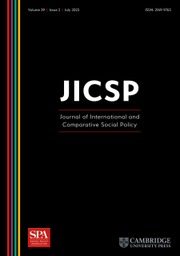Article contents
Commodification, vulnerability, risk: gendered social policy developments in the United States, 1980–2018
Published online by Cambridge University Press: 09 March 2020
Abstract
Over the last few decades, the position of women vis-à-vis the welfare state has changed dramatically. Welfare states have adapted to women's increased labour force participation and to the “new social risks” that characterize postindustrial societies. In this paper, we examine gendered policy developments in the US, focusing on conceptions of vulnerability that inform policies meant to mitigate gendered social risks. Focusing on three policy areas: parental leave, domestic violence and disability, we show that policies increasingly target women's integration into the workforce and self-regulation as strategies to mitigate gendered social risk. We also discuss how these policies rely on individual interventions implemented by what we call punitive therapy practitioners, who encourage women's workforce participation and psychological self-regulation. Finally, we argue that enduring gendered conceptions of vulnerability have shaped the specific designs of policies that emerged in the 1960s–1970s, intensified through the 1980s, 1990s, and early 2000s, and persist today.
- Type
- Research Article
- Information
- Journal of International and Comparative Social Policy , Volume 35 , Issue 1: SI: Recent Social Policy in Canada and the United States , February 2019 , pp. 41 - 58
- Copyright
- Copyright © 2019 Informa UK Limited, trading as Taylor & Francis Group
Footnotes
The authors are equal co-authors and the names are in alphabetical order.
References
- 3
- Cited by


